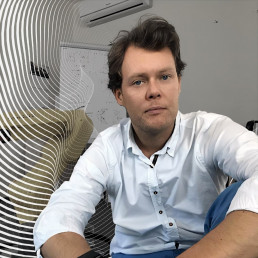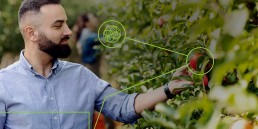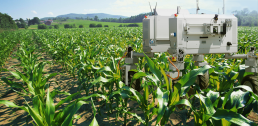On the eve of the AgriFood Forum 2021, an international creative workshop will be organized
On November 24th, the eve of the AgriFood Forum 2021, the organizers of the forum AgriFood Lithuania DIH will hold the Robotics4EU international creative workshop, which aims to raise awareness among all stakeholders – from robotics decision makers, developers or policy makers to end users and society as a whole – on the non-technological challenges of robotics. Participation in the event is free, but pre-registration is required.
“Industry is moving forward at an incredible pace and the agrifood sector is not an exception. Studies show that this sector is highly receptive to the implementation of robotics solutions based on artificial intelligence. As these advanced solutions in various sectors are being implemented more and more rapidly today, in the near future we will face more than just financial or technical challenges. Equally important are non-technological aspects of robotics such as potential ethical, legal, data security, privacy or socio-economic issues that may arise in society. The aim of this creative workshop is to provide an opportunity and encourage different stakeholders to talk about these potential challenges now,” said Kristina Šermukšnytė-Alešiūnienė, Director of AgriFood Lithuania DIH.
During the online creative workshop, which will be held in English, experienced experts will share their insights on the biggest non-technological challenges that the world of robotics is currently facing, introduce the concept of responsible robotics and share the best practices from around the world. In addition, participants of the workshop will work in groups, discuss these topics together and present the results of their work at the end of the event.
Event organizers encourage everyone to register and spend three productive hours together with a team of initiative professionals.
The AgriFood Forum 2021 will propose a new direction
The AgriFood Forum 2020 was a real surprise. The two-day forum, which was organized virtually for the first time, attracted more than 1,800 unique viewers, 500 of whom were participants from abroad. What is more, each participant spent an average of more than 4 hours on the forum. The AgriFood Lithuania DIH, the main organizer of the event, has a very clear mission for the AgriFood Forum 2021. According to the hub, it is time to turn ambitions into real actions and commonly agree on the implementation of the sustainable food supply chain. The hybrid AgriFood Forum 2021 will take place on 25th of November.
“The agri-food sector does not have its own separate concept and is therefore often treated as a separate part of Industry 4.0. However, in Lithuania this sector is rapidly transforming and even acquiring the features of Industry 5.0. In this context, the synergy between man and technology, combining the human mind and creativity with the efficiency of technology, becomes paramount. We must unite business and scientific efforts and both create a clear vision and mission of our country’s agri-food sector for the coming decades, and show its importance for Lithuania’s growth. This will not only create a sustainable and healthy environment, but will also attract large investments and encourage young people to take an interest in the field of agri-food and create value for Lithuania in the regions,” said one of the speakers of the AgriFood Forum 2021 Vytautas Magnus University Rector Juozas Augutis.
Two clear directions of the forum can be identified in the concept being developed by the forum organizers. The agrifood sector is often underestimated as an underdeveloped sector where high value-added products are not developed. This is a myth that the organizers will destroy by proving the connection of this sector with IT and the most advanced technological solutions being developed on the market. Secondly, the agrifood sector is particularly cross-sectoral and important for the social development of our society. This will be proved by the smaller forums that will take place on different stages during the forum, covering topics ranging from agriculture to the importance of renewable energy, logistics, investment, education or rural development.
Augustas Alešiūnas, CEO at ART21, emphasized the rapid technological development of the sector and its potential to keep growing. “The agri-food sector is experiencing a peak period worldwide. Europe is focusing on the development of technologies related to 5G, robotics and autonomous technology. The growth trends of the sector are stimulated not only by the direction of the Green Deal initiated by the European Commission, but also by the decisions of private investors to continue investing record amounts into technologies developed for the agri-food sector. They do this because they see the potential in the agri-food sector to develop solutions that will generate huge returns. If we, as a state, do not miss this opportunity, our country’s innovators could create novel solutions and generate great value for the Lithuanian economy,” Augustas Alešiūnas, another speaker of the AgriFood Forum 2021, presented the international context.
This year, the main topic of the AgriFood Forum is the implementation of a sustainable food supply chain by enabling synergies between primary actors – farmers – and other stakeholders such as processors, distributors, consumers and policy makers. The organizers of the forum would like to inform everybody that the event is free of charge and invite everyone to register.
EIT FOOD Challenge Labs for the AgriFood Sector are Being Organized in Lithuania
The EIT FOOD Hub in Lithuania AgriFood Lithuania DIH has announced the beginning of the registration for the HACK AgriFood’21 Challenge Labs. The final event of the Challenge Labs will take place on November 17-18 and the winning team will be awarded a € 2,000 cash prize. Students of all ages and specialties, young innovators and everybody who wants to contribute to the creation of a more sustainable food value chain in Lithuania are invited to register individually.
During the event, participants will be divided into teams and will have to choose one of the six challenges presented by the organizers: Sustainable aquaculture, Short food supply chain, Sustainable food packaging, Re-use of food production by-products, Agriculture - an attractive sector for society and Alternative proteins.
"Over the last few years, we have organized many successful international hackathons. However, we are always looking for something new, so we decided to offer a different format this autumn. In the past, we lost a lot of potential participants (and their innovative ideas!) because they were unable to discover the team. This year, we are following the experience of EIT FOOD, the leading food innovation initiative in the EU. According to the new model, registrations will be individual and participants will be teamed up according to their abilities and competencies. In addition, teams will have to address not only technological, but also social, communication and marketing challenges. Therefore, even more people who care about the agrifood sector and the sustainability of the environment in which we live will be able to participate in this year's event,” said Kristina Šermukšnytė-Alešiūnienė, Director of the AgriFood Lithuania DIH.
The organizers of the event AgriFood Lithuania DIH have organized such international hackathons as HACK Digital Sea’21, HACK AgriFood’20 and HACK AgriFood’19 in recent years.












